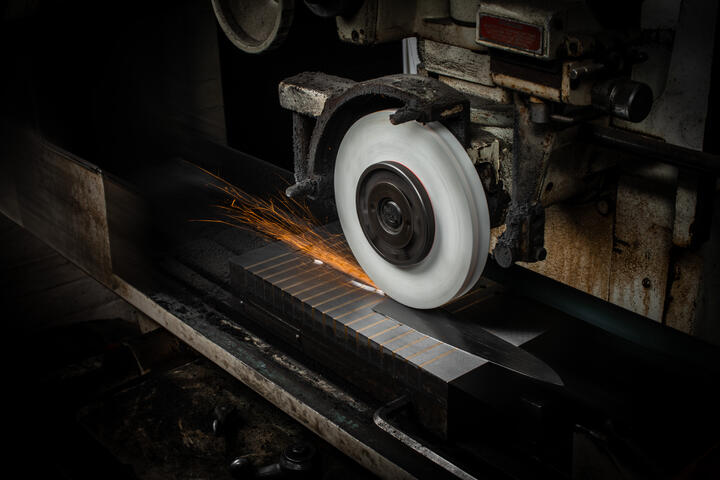At the cutting edge of knifemaking
10 March 2021Engineers from the University of Sheffield Advanced Manufacturing Research Centre (AMRC) helped the ‘Aston Martin of the knife world’ explore new cutting technologies and develop process efficiencies for its handcrafted bespoke blades.
Savernake Knives approached the AMRC for assistance in developing the manufacturing strategy of its custom knife blades, which are machined directly from Sandvik knife steel billet in the soft state, then hardened, ground and polished. The company wanted to simplify the process to harden the billet before machining, followed by grinding and polishing steps.
The AMRC, a member of the High Value Manufacturing (HVM) Catapult network of research centres, successfully demonstrated a proposed process on a representative machine tool, developing better cutting strategies for machining, exploring cutting technologies and reducing the overall time of the knifemaking process.
Laurie Timpson, founder of Savernake Knives, describes its products as the ‘Aston Martin of the knife world’ - every part is made by hand and designed with technology also used in the construction of parts in Formula One racing cars.
He said: “For a small business like ours, when we want to develop the way we manufacture our knives, we’re usually facing a huge amount of trial and error. There are so many variables involved in these processes, we’re talking thousands of options for tools which often means disappearing down a lot of rabbit holes.
“We work with hardened steel, which is primarily used in defence and Formula One, where information is tightly protected. It’s exhausting to always work from first principles. This is exactly why the work of the AMRC is so helpful. It has access to a lot of programmes, simulations, tool options and expertise which means it was able to save us about six months of time and avoid rabbit holes altogether.”
The work of the AMRC is so helpful. It has access to a lot of programmes, simulations, tool options and expertise which means it was able to save us about six months of time and avoid rabbit holes altogether. - Laurie Timpson, founder of Savernake Knives.
Project Engineer at the AMRC Machining Group, Emma Parkin, worked with Savernake on the project, which was funded through the HVM Catapult as part of its commitment to supporting SMEs.
Emma said: “This is a business making beautiful handmade, top-end knives, and there are a lot of processes each product must go through before it’s complete. At the moment, Savernake is cutting knives from soft steel and the process of hardening this, and eliminating the twists, takes days. They wanted to explore how to cut the knife from hard steel.
“I worked with them to look at ways to reduce the stress on the part as it is being cut and was even able to produce a knife for them in this way. I also looked at their polishing process and was able to suggest brushes that would work well. Finally, I suggested suppliers they might want to consider.
“Savernake is a busy business, and this project was all about bringing in that additional resource and expertise to help them consider which of their processes could be approached differently to result in greater efficiencies overall.”
Savernake is now taking forward a slightly modified version of the recommendations for tools and manufacturing processes that came from the AMRC.
Laurie said: “We’ve done a little refinement, but nothing compared to the task it would’ve been without their help. I would recommend this five-day support scheme to any SME that needs this kind of boost. It’s free and it’s good - what more could you want?”


